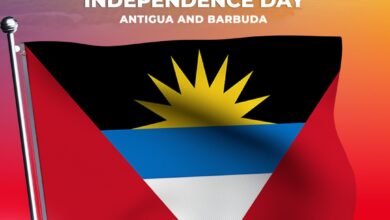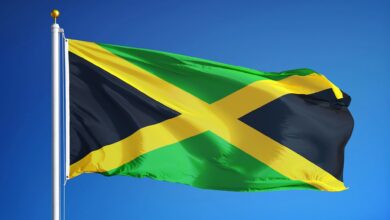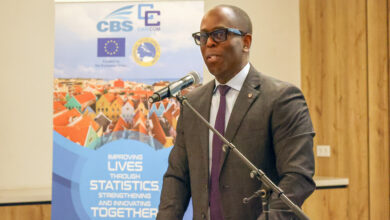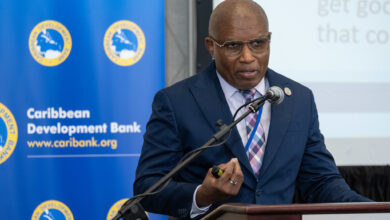Our undoubted quest is for an optimal integration of the Caribbean. This is a great cause and has been so for generations. Great causes have never been won by doubtful men and women. Despite the challenges and criss-crossing contradictions which may threaten to undermine our quest of this great cause, we ought never as a Caribbean people to succumb to any debilitating self-doubt about deepening or widening our regional integration enterprise. More than ever, our regional leaders, singly and collectively, ought yet again to summon the better instincts of our people for the enhancement of our four integration pillars and the further ennoblement of our Caribbean civilization, in practical terms.
The complex constellation of the current socio-economic and political forces demands an historic, collective leadership effort to lift the mood of gloom which has enveloped our integration processes in CARICOM in recent times. To be sure, leaders may make history only to the extent that historical circumstances permit them so to do. I aver, though, that our contemporary, Caribbean condition and our bedrock of achievements, thus far, provide an unassailable basis for an optimal integration beyond what currently exists, if we truly so desire.
The very difficulties in the international political economy and their acute manifestations in our regional content ought to prompt greater, not lesser, integration. At the CARICOM level, we have missed opportunities since the financial and economic meltdown of September 2008, and continuing. Rather than strengthen our regional integration mechanisms, some CARICOM member-states have tended to opt for nationalist or even chauvinist solutions. Only the member-states of the more tightly-drawn Organisation of Eastern Caribbean States (OECS) have sought, practically, to deepen and solidify their sub-regional integration framework.
Our collective CARICOM political leadership has permitted a “mood of gloom” to descend upon the wider integration movement because of our failure, first, to differentiate between “mood” and “strength”, and secondly, to build upon the unquestionable strengths present and enduring in CARICOM. A sour or crippling mood, if left unattended, is likely to metamorphose into a disability and, accordingly, may sap the inherent strength of the organism.
So, let me re-affirm generally the strengths which reside in the four major pillars of our regional integration movement: Functional cooperation; coordination of foreign policy; trade and economic integration; and a coherent rationalisation of regional security. In each of these four bundles of integration activities there have been, and there are, significant achievements which ought never to be belittled. Indeed, it is our duty to build upon them creatively and optimally.
The sense that CARICOM is sputtering or stagnating, in a context where an overwhelming urgency is required, relates to a core of considerations, namely, putting the “single economy” on “pause” for the time being; stalling on the issue of “freedom of movement”; the challenges in the “governance” arrangements and related implementation deficits; and the muting or relative absence of strong, persuasive, integration voices from the regional political leaderships.
This Heads of Government Conference must contribute to removing the pall of gloom from CARICOM. This can be done in three ways: First, make a realistic assessment of our integration movement’s strengths and weaknesses, possibilities and limitations with a view of enhancing its strengths and possibilities and reducing, as far as is humanly possible, its weaknesses and limitations; secondly, set optimal, clear-cut achievable targets with reasonable time-lines; and thirdly, imbue the integration movement with an urgent spirit of renewal of refreshing.
In moving forward, several acknowledgements are in order. First, we must appreciate that a veritable universal social law of “combined and uneven development” grips our integration movement, inside and outside. Objective factors, not easily wished away, may account for the “unevenness” in the development of CARICOM. Indeed, the “uneven” development is not necessarily undesirable. For example, enhanced functional cooperation in health education, social security, telecommunications, energy, and national security may yield far greater benefits to the population than a “single economy” which is skewed or unequally yoked.
Secondly, we must acknowledge frankly, that CARICOM demands focused leadership from Barbados, Guyana, Jamaica, and Trinidad and Tobago. It is not that the member-states of the OECS, Bahamas, Belize, Haiti, and Suriname are not of vital importance. It is simply that the “Big Four”, for various reasons, must, in a coordinated way, drive, pull, or push the regional juggernaut. In each of these cases it is arguable that domestic considerations were, possibly, an encumbrance or a limitation on optimal regional activity. If that has been the case in any of these countries, the region can no longer afford the luxury of such relative non-engagement. Indeed, the relative non-engagement by any of the “Big Four” inexorably leads to the diminution of engagement by others. It was perhaps inevitable that the change in government in Trinidad and Tobago in May 2010 would have resulted in a greater emphasis on domestic, rather than on regional, matters. I feel sure that the Government of Trinidad and Tobago which is populated by committed regionalists would again be at the fore in pushing the regional agenda on all fronts. The simple truth is that on the large strategic concerns, the line between the “national” and the “regional” is blurred to the point of non-existence. Globalisation and the altered architecture of the international political economy have caused this to be so.
Let us face certain facts squarely: No credible, sustainable regional solution to the challenges of CLICO and British-American Insurance Company (BAICO) is possible without the active involvement of the Government of Trinidad and Tobago. The same holds for a host of issues including trade, regional governance, regional security, regional air and sea transportation, energy, health and education.
The leadership of Trinidad and Tobago, and indeed of the “Big Four”, does not in any way mean a diminution of the importance on leadership of the other member-states of CARICOM. I simply make a salient point of practical politics in going forward.
Colleague Heads, Your Excellencies, while CARICOM was more or less marking time over the past year or two, the member-states of the OECS moved resolutely and in solidarity towards the establishment of an OECS Economic Union in January 2011. By August 01, 2011, there will be complete “freedom of movement” of citizens between the six member-states of the Economic Union, namely, Antigua and Barbuda, Dominica, Grenada, St. Kitts and Nevis, St. Lucia, and St. Vincent and the Grenadines. Further, there are altered governance arrangements to suit this more profound OECS Union. This deepening of the OECS Union beyond the current parameters of the Revised Treaty of Chaguaramas and a functioning CARICOM clearly demands an amendment to the CARICOM Treaty itself to take account juridically of the explicit special and differential treatment of the member-states of the OECS.
The OECS, as a bloc, has a range of issues targeted for resolution within the framework of CARICOM. At the top of the pile is the reality that OECS member-states do not benefit proportionately or at all from the “single market” arrangements in CARICOM. Indeed, the CARICOM trading regime has contributed to the denudation of the manufacturing base in the OECS without necessarily benefiting the OECS consumer in terms of competitive price and quality. Further, the compensating mechanisms in the Revised Treaty of Chaguaramas which are designed to assist the “disadvantaged” countries of the OECS, have been insufficiently rolled out. We look forward with great interest to the next round of financing for the CARICOM Development Fund, mandated as an obligation under Article 158 of the Revised Treaty of Chaguaramas. CARICOM, in its trading and “single market” manifestations, is unlikely to survive unchallenged if it continues to be too highly skewed or unequally yoked in favour of one or two of the “Big Four”.
Mr. Chairman, it would be inexcusable if I say nothing about the twin-issue of “hassle-free” travel and “freedom of movement” of CARICOM nationals. Clearly, “hassle-free” travel is a norm to which all civilised peoples must aspire to achieve. To be sure, immigration and customs personnel are obliged to enforce the laws and regulations of each nation-state. In their enforcement of the laws, there are clear strictures laid down in addition to a wide ambit of discretion. Surely, it is not beyond our civilised regimes to accommodate visitors in a manner which is not dehumanising, insulting, belittling or embarrassing. At practically every port of entry in CARICOM, we simply do not treat our CARICOM brothers and sisters as well as we should. In some cases, the treatment is wholly unacceptable. Each nation-state must resolve to lift its game is regard; and the CARICOM Secretariat should be permitted to monitor our performance.
Regarding the narrower issue of “freedom of movement” of CARICOM nationals, four considerations arise: First, in accordance with international law, all migrants have a minimum bundle of rights which must be observed by all nation-states. Secondly, there are explicit categories of CARICOM nationals who are accorded “freedom of movement” under the Revised Treaty of Chaguaramas and decisions of the Conference of Heads of Government. Thirdly, there are CARICOM nationals outside of the “freedom of movement” categories – and they are the bulk of the people – who are subject to general immigration laws. And fourthly, in respect of the “freedom of movement” categories, do the circumstances of these persons give rise to contingent rights, and, if so, what are these contingent rights?
“Freedom of movement” thus, though posited as a long-term goal of CARICOM, is currently regulated and is likely to be so in the foreseeable future. Under the extant circumstances in our region, there are those who persuasively argue that it cannot be reasonable for every Jamaican, Guyanese or Vincentian to have the right freely to migrate, work and reside in Barbados or Trinidad. Similarly, the argument goes that neither the Jamaican, the Guyanese, the Barbadian nor the Trinidadian can expect to have the right freely to migrate, work, and reside in Antigua, St. Kitts, St. Lucia or St. Vincent and the Grenadines. But each of these intended migrants ought reasonably to expect precision in the rules of admission, especially for the “freedom of movement” categories, and a core minimum bundle of contingent rights, without which the “freedom” categories are basically meaningless.
This matter of “freedom of movement” has to be dealt with honestly, realistically, transparently, meaningfully, and without a meanness of spirit. The realities of small size, high unemployment, inadequate housing, over-stretched social services, and crime, enter the mix of considerations which limit the extension of categories for “freedom of movement”. However, once the categories have been agreed upon, CARICOM member-states have a legal obligation to comply unless there is an explicit derogation granted under the Revised Treaty of Chaguaramas itself. In short, everything which we do in this very sensitive area must be strictly rules-based, certain, and infused with a generosity of spirit.
Mr. Chairman, the awesome challenges, man-made and arising from nature, which have come upon us from outside our region, and inside, since the financial and economic unraveling internationally in September 2008, are still with us. Advanced western economies are still in turmoil. The adverse economic conditions in Portugal, Ireland, Greece, and Spain have grabbed the headlines but we have been advised that Italy and Britain are in a not dissimilar queue. In our giant neighbour, the USA, we have been told that the recovery has been underway since last year, 2010. Some of the data, however, are dispiriting: A record number of Americans (43 million or 14.3 percent of the population) is on food stamps; 14 million persons are unemployed and huge numbers of these have been unemployed beyond the eligibility period for unemployment benefits; 1 ½ million persons were declared bankrupt last year; three million home-owners were served with re-possession notices and 1 million of these have had their homes repossessed; and unemployment figures for the unskilled and minority ethnic groups are twice the national unemployment rate of 9.1 percent. These are chilling numbers from our principal source market for tourism, services and remittances.
In our region, the member-countries of the Eastern Caribbean Currency Union (ECCU) carry a liability of almost EC $2 billion (US $800 million) or 16 percent of the ECCU’s Gross Domestic Product (GDP) from the CLICO and BAICO collapses. Three of the six members of the OECS Economic Union (Antigua and Barbuda, Grenada, and St. Kitts and Nevis) are on IMF programmes. Jamaica has a stand-by arrangement with the IMF. Economic growth in CARICOM over the past three years has been negative, on an average. Guyana appears to be a bright growth prospect. Everywhere, across the region, the faces of men and women are strained and anxious. Fiscal problems, no growth or low growth, increased joblessness, a rise in poverty in some countries, a slow-down in foreign direct investment, and natural disasters have been our companions over the past three or so years. They are likely to be with us for the foreseeable future.
Despite all these challenges, our region has been able to hold things together. Indeed, we have maintained highly sophisticated, liberal democratic societies grounded in the tried and tested particularities of our Caribbean civilisation. While authoritarian regimes in North Africa and the Middle East have been racked by sustained, mass public protests and even civil wars, here in the Caribbean we have had one government returned to fourth term in St. Kitts and Nevis, another returned for a third consecutive term in St. Vincent and the Grenadines, a new Prime Minister in Barbados consequent upon the death of a dearly departed brother, and the election of new governments in Haiti and Suriname. We took all the ensuing challenges in our competitive democratic strides, noisily and robustly, but peacefully. We must never take all of this for granted.
The next six months cannot be business as usual. We have a new Chairman, the distinguished and long-serving Prime Minister of St. Kitts and Nevis, Dr. Denzil Douglas. His hands are safe, re-assuring and innovative. He will build upon the new departures sketched during the tenure of his splendid predecessor, Prime Minister Tilman Thomas of Grenada. I expect that this Conference of Heads of Government will decide on the person to hold the office of Secretary General. On this there can be no further delay, no further temporising, no further provisional or “ad hoc” leadership at the helm. Our Acting Secretary General has held the fort well but there is an urgency for renewal now.
Dr. Douglas and the new Secretary General will require focussed support from all concerned, especially from the Heads of Government and State. Like Issachar, one of the leaders of the ancient Twelve Tribes, whose outstanding merit was that “he knew the times and knew what was good for Israel”, we must know our times and what is good for the Caribbean. And like Daniel in the Old Testament we leaders must endeavour always to act with an “excellent spirit”. Let’s really try!
Thank you!





